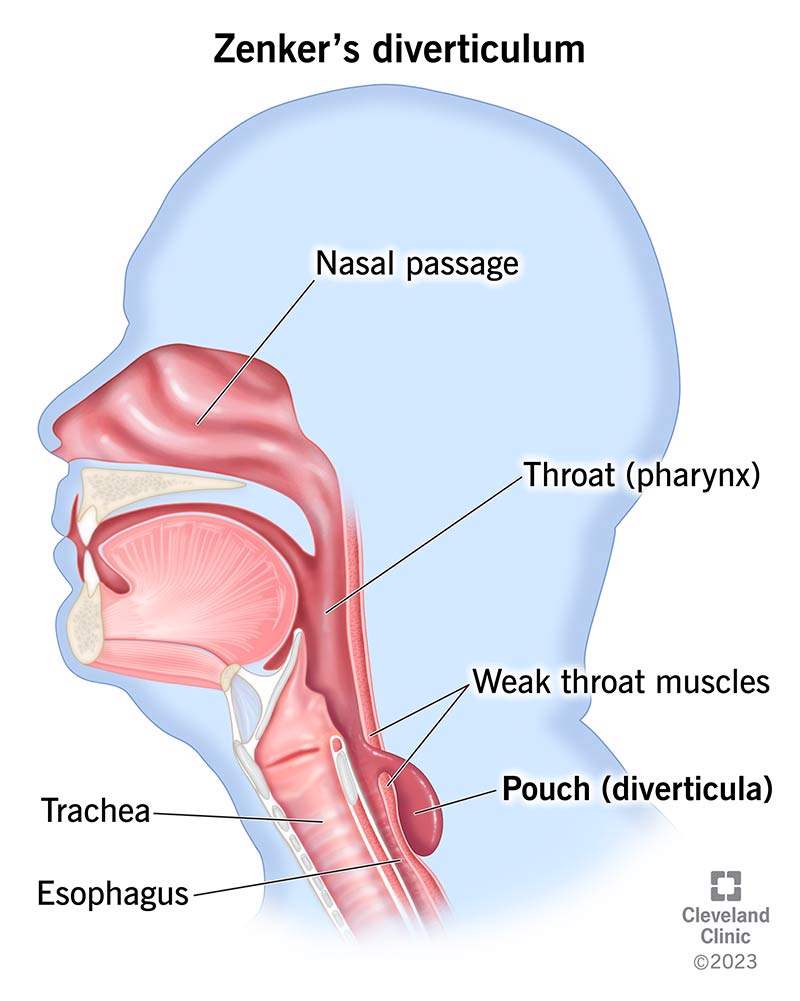Zenker’s diverticulum is a pouch that forms at the top of your esophagus, so it’s hard to swallow. The condition happens when a muscle at the top of your esophagus (cricopharyngeus muscle) doesn’t relax to let food move into your esophagus. Symptoms include food regurgitation and bad breath. Treatment is surgery to remove or fix the pouch.
Advertisement
Cleveland Clinic is a non-profit academic medical center. Advertising on our site helps support our mission. We do not endorse non-Cleveland Clinic products or services. Policy

Image content: This image is available to view online.
View image online (https://my.clevelandclinic.org/-/scassets/Images/org/health/articles/zenkers-diverticulum)
Zenker’s diverticulum is a pouch that develops in your throat. It can make swallowing difficult. The pouch forms when your cricopharyngeus muscle, which is the upper sphincter muscle of the esophagus, doesn’t work like it should. Constant pressure from this muscle creates back pressure on the wall of your throat.
Advertisement
Cleveland Clinic is a non-profit academic medical center. Advertising on our site helps support our mission. We do not endorse non-Cleveland Clinic products or services. Policy
Over time, that pressure may push tissue through the throat wall to make a pouch or outpouching. The pouch may cause issues like difficulty swallowing, regurgitating food or bad breath. Medical treatment is surgery to remove or open the diverticulum. Changing how you eat may ease Zenker’s diverticulum symptoms.
Symptoms may vary depending on the size and location of the pouch (diverticulum). For example, you may not have symptoms unless the pouch gets big enough to affect your ability to swallow food. Symptoms may include:
Advertisement
Zenker’s diverticulum happens when your cricopharyngeus muscle doesn’t relax like it should. Normally, this muscle constantly squeezes your upper esophageal muscle to close off your esophagus. It relaxes when you swallow food so that food can move from your throat into your esophagus. When this muscle doesn’t relax, your upper esophageal sphincter doesn’t open as much as it normally does.
At the same time, powerful muscles in your throat push food down toward your cricopharyngeus muscle. The combination puts pressure on the walls of your throat.
In Zenker’s diverticulum, that pressure can push tissue through a weak spot in your throat to make a pouch or outpouching (diverticulum). The pouch affects how food moves from your throat into your esophagus.
Experts don’t know what causes the cricopharyngeus muscle to tighten when it should relax.
Risk factors for developing Zenker’s diverticulum include:
The condition may cause complications that include:
A healthcare provider will do a physical exam. They’ll ask about your symptoms. They may ask if you have a type of esophageal dysmotility. They may refer you to a gastroenterologist for tests, including:
Treatment is usually surgery to remove or fix the pouch so you can swallow. Your gastroenterologist may recommend surgery if the pouch causes serious complications like malnutrition or aspiration pneumonia. But not everyone who has Zenker’s diverticulum will need surgery. There are different types of surgery to treat it:
Your gastroenterologist will discuss surgery options so you can both decide on what makes sense in your situation.
Advertisement
Your recovery time will be different depending on the type of surgery you have. In general, it takes longer to recover from open surgery than endoscopic or ZPOEM surgery. Your gastroenterologist will explain what you can expect, but the recovery process typically includes:
Open and endoscopic surgery have similar potential complications:
You should talk to a healthcare provider if you have swallowing issues that don’t go away. If you have surgery for Zenker’s diverticulum, contact your gastroenterologist if you have infection symptoms like fever or pus coming from the incision.
Treatment may cure this condition. But Zenker’s diverticulum can come back. Ask your gastroenterologist about which symptoms may mean that there’s a new pouch in your throat.
Advertisement
Zenker’s diverticulum can make it hard for you to swallow food. You may feel like food is getting caught in your throat. Here are some steps that may help move food past the pouch:
Several things can cause a lump in your throat that makes it hard to swallow. Strong emotions like joy or grief can make your throat tighten. But sometimes, conditions like Zenker’s diverticulum can turn the simple act of swallowing into an ordeal.
Zenker’s diverticulum is a pouch that forms in your throat. It develops when food can’t move from your throat to your esophagus. The pouch may not cause problems unless it gets big enough to keep you from swallowing food. It doesn’t go away on its own. Fortunately, there are treatments for Zenker’s diverticulum.
Advertisement

Sign up for our Health Essentials emails for expert guidance on nutrition, fitness, sleep, skin care and more.
Learn more about the Health Library and our editorial process.
Cleveland Clinic’s health articles are based on evidence-backed information and review by medical professionals to ensure accuracy, reliability and up-to-date clinical standards.
Cleveland Clinic’s health articles are based on evidence-backed information and review by medical professionals to ensure accuracy, reliability and up-to-date clinical standards.
Swallowing disorders (dysphagia) can affect how you eat and drink. Cleveland Clinic is here to help you manage your dysphagia and feel better.
